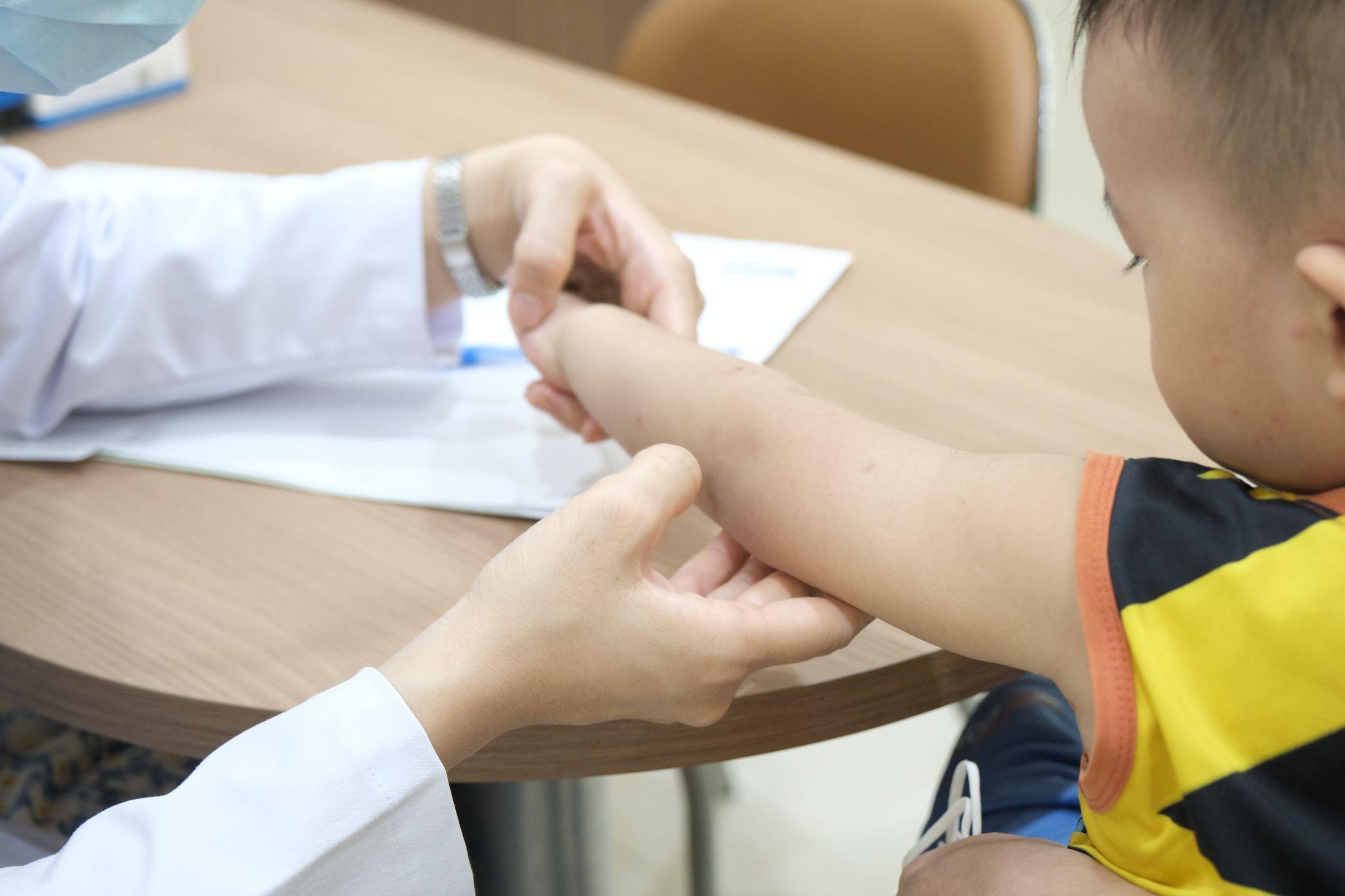According to Dr. Phan Thi Tuong Van, a pediatrician at Tam Anh General Clinic, District 7, mosquito-borne diseases in children can occur year-round in Vietnam but often peak during the summer rainy season. Children's immune systems are still developing, making them more vulnerable to mosquito-borne viruses.
Dengue fever
This is a dangerous and common disease in children, especially in large cities and densely populated areas. It is transmitted by the Aedes aegypti mosquito, which bites an infected person, then transmits the Dengue virus through its saliva to a child. The virus attacks cells and causes a systemic inflammatory response.
The Dengue virus increases the permeability of blood vessel walls, causing plasma (the liquid part of blood) to leak out. This leads to blood thickening, a drop in blood pressure, and potentially shock and multiple organ damage. The disease also causes a decrease in platelets, increasing the risk of uncontrolled bleeding and death if not treated promptly.
The disease progresses rapidly. After 2-4 days of high fever, a sudden drop in temperature can occur, marking a critical phase (unlike other viral fevers where a drop in temperature signals recovery, typically between days 3 and 7). Warning signs of severe dengue include lethargy, fatigue, frequent vomiting, severe abdominal pain, nosebleeds, bleeding gums, or bleeding under the skin.
 |
A doctor is examining mosquito bites on a child's arm. Illustrative photo: *Tam Anh General Clinic, District 7* |
Japanese encephalitis
This disease directly attacks the child's nervous system. It's transmitted by the Culex mosquito (commonly known as the rice field mosquito), which breeds in rice paddies, ditches, and ponds. These mosquitos bite infected animals like pigs and wild birds, becoming carriers of the virus. They then transmit the virus to children through their bite, from which the virus travels to and attacks the brain, causing encephalitis (brain swelling). This inflammation destroys nerve cells.
Dr. Van warns that Japanese encephalitis has a high mortality rate. Even if a child survives, they may suffer permanent neurological damage such as paralysis, hemiplegia, intellectual disability, mental retardation, seizures, and epilepsy. The disease is preventable through vaccination, starting at 9 months of age.
Malaria
Dr. Van says malaria is now well-controlled in major cities but remains a threat in rural areas. It's transmitted by the Anopheles mosquito, which bites people infected with the Plasmodium parasite. Once inside a child's body, the parasite travels from the blood to the liver to multiply. It then returns to the bloodstream and enters red blood cells, where it continues to reproduce and eventually ruptures the cells, releasing new parasites. This cycle of red blood cell destruction causes severe anemia in children, leading to paleness and fatigue.
More dangerously, the disease can lead to complications like cerebral malaria, liver failure, kidney failure, and lung damage. Parasite-infected red blood cells can block small blood vessels in the brain, causing seizures and coma. Excessive inflammation due to the parasite can damage the liver, kidneys, and lungs, potentially leading to death.
Chikungunya fever
Like dengue fever, Chikungunya is transmitted by the Aedes mosquito. However, while the Dengue virus primarily attacks blood vessels and platelets, the Chikungunya virus targets joints, multiplying rapidly in the cells of the synovial membrane and causing inflammation.
The most prominent symptom is severe joint pain that can prevent normal movement. This arthritis can become chronic, affecting quality of life. Other symptoms in children include high fever, rash, and headache, similar to dengue fever, which can lead to initial misdiagnosis.
Vietnam has not recorded any cases of Chikungunya, but serological studies suggest it has circulated in the community. Therefore, there is a risk of its re-emergence. Dr. Van advises parents to protect their children by preventing mosquito bites. Children should sleep under mosquito nets (even during naps), wear long-sleeved clothing, and use child-safe mosquito repellent products. Homes should be kept clean, standing water in containers should be eliminated, water jars should be covered, and fish should be introduced into water tanks.
If a child shows signs of fever, especially high fever, parents should immediately take them to a medical facility for diagnosis and treatment, and avoid self-medicating.
Dinh Lam
| Readers can submit questions about children's health here for doctors to answer. |












